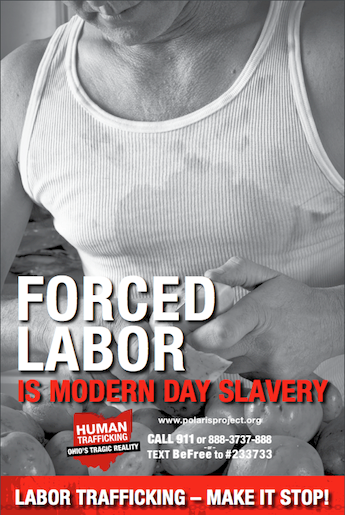A Look At Trafficking in a MidWestern State
June 23, 2016
Tony Sinkewich
Opinion
�
Forced Labor,
Sex Trafficking
If asked about human trafficking, what would first pop up in your mind? I used to think of human trafficking as illegal prostitution in third world countries. It was a crime that only existed where there was no real law and order and where drug lords had total power. I would think of brothels in Eastern Europe or India as well as the movie Taken with Liam Neeson. Human trafficking seemed like it was the rest of the world’s problem and that it couldn’t possibly exist where I live.
The reality is that human trafficking has been reported in all 50 states in the U.S., so no matter where you live in this country, you are in close proximity to somebody held captive in the land of the free. Knowing that, I wanted to take a deeper look into my home state of Ohio because I’ve always heard rumors of human trafficking being a real problem here, but I’ve never really been made well-aware.
Usually, Ohio comes up in conversation of the topic because it consistently ranks as one of the top five places with the highest volume of reports to Polaris - a non-profit organization that operates the U.S. national human trafficking hotline. What I really want to know is why Ohio and if human trafficking is truly a problem in the Buckeye State.
Why Ohio?
Anyone who is from Ohio can tell you our cities are no Las Vegas. Ohio isn’t really the entertainment capital of the world nor are the cities as heavily populated and diverse as New York City or Los Angeles. So what makes Ohio prime for such vast networks of human trafficking? A report from the Ohio Trafficking in Persons Study Commission explains this in detail, but three main reasons why human trafficking thrives in Ohio are as follows:
- Ohio is not a heavy tourist destination; thus, it is not likely that Ohio is the main destination for traffickers. It is more likely that Ohio acts as a distribution center where victims are collected and then moved around to outside destinations.
- Ohio is close to the Canadian border in the north and is bordered by the Ohio River in the south. Proximity to these two provides natural transportation routes.
- Columbus is smack dab in the center of interstate highways connecting Chicago, Washington, D.C., New York, Pittsburg, Nashville and Indianapolis. Basically, most commercial freight vehicles at some point pass through Ohio; therefore, truck stops and freight yards are potential trafficking hotspots.
Human Trafficking Statistics in Ohio
The office of the Ohio Attorney General releases a report every year on the status of human trafficking in Ohio. Here are the main points:
- It is estimated that about 1,000 children are trafficked in and out of Ohio every year for forced prostitution.
- In 2015, law enforcement reported 102 human trafficking investigations leading to 104 arrests and 33 criminal convictions.
- In November, a 38-year-old northeast Ohio man was sentenced to more than 27 years in federal prison because he had been harboring a 17-year-old girl in a motel room for the production of internet pornography.
- 203 potential victims were identified - 196 female, 3 male, 4 no gender specified
- Law enforcement identified 130 suspected traffickers
What Is Being Done?


Campaign posters from the Ohio Human Trafficking Task Force.
Ohio has passed landmark legislation to address the crime of modern-day slavery within its borders, for which the Polaris Project recognized the state as one of the four most improved states in anti-trafficking laws. The legislation is a crucial piece of a broad effort to end human trafficking in Ohio.
Furthermore, the Ohio Human Trafficking Task Force launched a massive advertising campaign to raise awareness about the crime.
Attorney General Mike DeWine says, “Ohio continues to lead the way as a model state in the fight against human trafficking. With the continued growth of local, anti-human trafficking coalitions and the ever expanding network of the Ohio Attorney General’s Human Trafficking Commission, there are few people in Ohio who remain unaware of the reality of human trafficking. By increasing the number of law enforcement officers trained in (anti-) human trafficking and by expanding (anti-) human trafficking task forces across the state, we will continue to see more traffickers brought to justice and more victims recovered. Through collaboration between concerned citizens, social service providers, public officials, law enforcement and other professionals, we can continue to make a difference for thousands of vulnerable Ohioans.”
The state of Ohio provides a free, one hour online training that provides a concise look into the problem Ohio faces and what has been done thus far.
Save the Human Trafficking Hotline Number
1-888-373-7888
Topics:
Forced Labor,
Sex Trafficking














